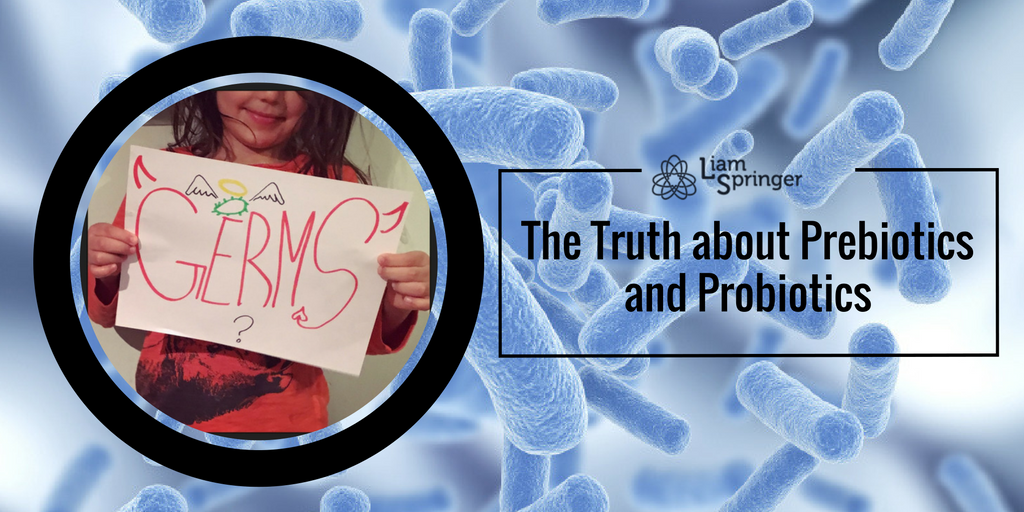
Let’s address the myth of “good” bacteria in the intestine. So often, intestinal bacteria are referred to as some sort of miracle germ that improves health and function. They are proclaimed to produce nutrients, increase your ability to absorb nutrients, improve your mood, create an appropriate appetite, help you lose weight, etc., etc. But is this true? Do miracle germs really exist? Are prebiotics and probiotics the answer to achieving optimal health?
If you’ve read my previous blog posts on intestinal bacteria and how they affect your health, you know that there’s no such thing as “good” bacteria—and that a healthy balance of intestinal bacteria is what’s most important when it comes to your health. The myth of “good” bacteria, as well as misconceptions about the complex relationships between your intestinal bacteria and the foods you eat, have lead to some misguided trends in the health industry. Despite popular belief, over-the-counter prebiotic and probiotic supplements have not been shown to improve human health or resistance to disease. Keep reading to learn why prebiotics and probiotics are not the answer.
Why Prebiotics and Probiotics Aren’t Good for You
Foods that are viewed as having harmful or beneficial effects are thought to do so via their interaction with the bacteria in your intestine (a.k.a. gut flora). Some foods (e.g., meat) are believed to activate or feed “bad” bacteria, causing negative effects (e.g., heart disease). Other foods (e.g., fiber-rich grains and beans) are believed to feed “good” bacteria, producing positive effects (e.g., improved metabolism, reduced inflammation). In reality, these relationships are far more complex. The concept that some bacteria are “good” and some are “bad” is overly simplistic.
Remember: There is no such thing as “good” bacteria—just bacteria that harm you less and outcompete the bacteria that harm you more.
The perception that feeding or increasing so-called “good” bacteria in your system with over-the-counter prebiotics or probiotics will lead to improved health is misled and, frankly, incorrect. There is no good evidence that prebiotics are having any positive effect and very limited evidence that probiotics are. While it’s true that probiotics have been shown to have some positive effect in treating IBS, “which individual species and strains are the most beneficial remains unclear.”1 This points to the fact that probiotics should not be considered a blanket treatment or a cure-all. While there is very good research being done regarding fecal transplants, we are still a long way from understanding how specific bacteria might be used orally to treat specific illnesses. It is more likely that an increased quantity of bacteria and/or increased feeding of the bacteria will result in gas, bloating, irritation of the intestine, and weight gain, as well as increased exposure to the toxic byproducts which are created by even the “good” bacteria.2-4
Over-the-counter prebiotic and probiotic supplements have not been shown to improve human health or resistance to disease.
The healthiest humans have low levels of bacteria, as well as a greater variety of bacteria—each type having its own niche and creating a healthier balance in the gut. So, why would you want to repeatedly feed or increase a certain type of bacteria via daily supplements? Especially when those supplements have not been shown to produce the desired health benefits.
How to Create a Healthier Balance
The answer to promoting a healthy balance of intestinal bacteria lies in your diet. To reduce the overall amount of bacteria in the gut and create a healthy balance, skip the prebiotic and probiotic supplements, and instead eat a diet that is high in fruits, well-cooked roots and vegetables, and healthy dairy products.5-7 To learn about specific foods that are great for creating a healthier balance in the intestine, check out my previous post: 5 Dietary Tips to Improve Gut Bacteria.
To reap the desired benefits of prebiotics and probiotics, instead eat a diet that is high in fruits, well-cooked roots and veggies, and dairy products.
For more info on the latest topics in health and nutrition, sign up for my newsletter. Want to try a new workout method that’s great for spine health, strength and stability, and flexibility? Join us for ELDOA group classes right here in St. Louis!
References
- Ford AC, Quigley EMM, Lacy BE, et al. Efficacy of prebiotics, probiotics, and synbiotics in irritable bowel syndrome and chronic idiopathic constipation: systematic review and meta-analysis. The American Journal of Gastroenterology 109 (Oct 2014): 1547-1561. http://www.nature.com/ajg/journal/v109/n10/full/ajg2014202a.html
- Kleessen B, Sykura B, Zunft HJ, Blaut M. Effects of inulin and lactose on fecal microflora, microbial activity, and bowel habit in elderly constipated persons. Am J Clin Nutr 65, No. 5 (May 1997): 1397-1402. https://www.ncbi.nlm.nih.gov/pubmed/9129468
- Kuo SM, Merhige PM, Hagey LR. The effect of dietary prebiotics and probiotics on body weight, large intestine indices, and fecal bile acid profile in wild type and IL10−/− mice. PLoS One 8, No. 3 (2013): e60270. https://www.ncbi.nlm.nih.gov/pmc/articles/PMC3605333/
- Misikangas M, Pajari AM, Päivärinta E, Mutanen M. Promotion of adenoma growth by dietary inulin is associated with increase in cyclin D1 and decrease in adhesion proteins in Min/+ mice mucosa. J Nutr Biochem 16, No. 7 (Jul 2005): 402-409. https://www.ncbi.nlm.nih.gov/pubmed/15992678
- Deopurkar R, Ghanim H, Friedman J, et al. Differential effects of cream, glucose, and orange juice on inflammation, endotoxin, and the expression of Toll-like receptor-4 and suppressor of cytokine signaling-3. Diabetes Care 33, No. 5 (May 2010): 991-997. http://www.ncbi.nlm.nih.gov/pmc/articles/PMC2858203/
- Allen NE, Grace PB, Ginn A, et al. Phytanic acid: measurement of plasma concentrations by gas-liquid chromatography-mass spectrometry analysis and associations with diet and other plasma fatty acids. Br J Nutr 99, No. 3 (Mar 2008): 653-659. http://www.ncbi.nlm.nih.gov/pubmed/17868488
- Babic I, Nguyen-the C, Amiot MJ, Aubert S. Antimicrobial activity of shredded carrot extracts on food-borne bacteria and yeast. J Appl Bacteriol 76, No. 2 (Feb 1994): 135-141. http://www.ncbi.nlm.nih.gov/pubmed/8144415






